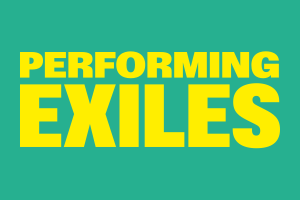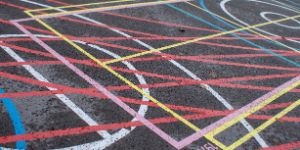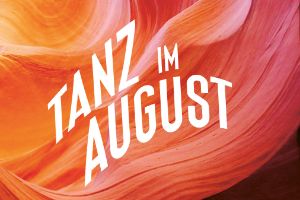Berlin is known for its numerous “Spielplätze” for kids, but the project “Radical Playgrounds” is a place where play gets serious. It arrives at Gropius Hain for eleven weeks like an itinerant, temporary funfair: both melancholic and light-hearted, sad and joyful, funny and serious. It merges a sculpture park with a maze, adds a skywalk, intertwined with a display on the history of playgrounds and activism, and ongoing performative workshops. A range of artworks will tackle the healing potential of collective play, creating a public space that addresses both adults and children, and shifts focus from competition to collaboration.
Before and during the European Football Championship in Germany, “Radical Playgrounds” also looks at the difference between the concepts of game and free play. Games have a set of rules and clearly defined winners and losers: they are often about channelling emotions and sublimating conflict and confrontation. While playing with each other, we are free to constantly change the situation and invent the rules as we go along. We can step back and come together once again, we can find words to name what is difficult, painful, or unsaid. Potentially, we can all win.
“Radical Playgrounds” is an invitation to a free space of collective learning and unlearning, one that is open to trying things out, and safe to err, radically non-competitive and offers a variety of activities: a place to practice and reflect on the socialising and political potential of play. As we walk around various pavilions, walk-in structures, and playable installations, we encounter works which employ the basic vocabulary of playgrounds, while advocating for much more. We are invited to engage with a decolonial sandbox, use an indigenous swing and a spin on an entropic carousel. We encounter game objects as a tribute to collective intelligence, which knows no other author than the whole of humanity. We can continue rebuilding an incomplete pyramid, whose parts were taken away to European museums or lie down for a deep listening session on how the planet vibrates. As an artistic parcours, “Radical Playgrounds” experiments with the commons and multidirectional public space in times of harsh polarisations and exercises the performative dimension of play as a condition that helps us to embrace change and overcome division.
In June, shortly before the opening of the European Football Championship in Berlin, a performance will show how the idea of a game can be challenged by that of the play in a two-person re-enactment of the East Germany v. West Germany match from 1974. The legendary piece by Massimo Furlan is based on experiences from the football pitch and uses movement, muscle memory and the original commentary to navigate a shifting terrain both of current asymmetries as well as of femininity and “weakness” in football. Taking this game as a starting point, the artists show the freedom of art to both challenge and sublimate spectacle but also to ask how art and play can mediate the current contexts of game, play and society.
The project will open at the end of April (between Stresemannstraße and Niederkirchnerstraße) and will gradually grow through a series of open workshops in the eleven weeks that follow. Together with architects, artists, mediators, thinkers, neighbours and visitors, we will transform the Gropius Bau parking lot into a public space of encounter. Ultimately, “Radical Playgrounds” is about what we might need very much now: some hope and resilience. And – to quote the project “Modellen” which transformed the Moderna Museet in Stockholm into an adventure playground in 1968 – it is an “exhibition only for those who do not play.”





